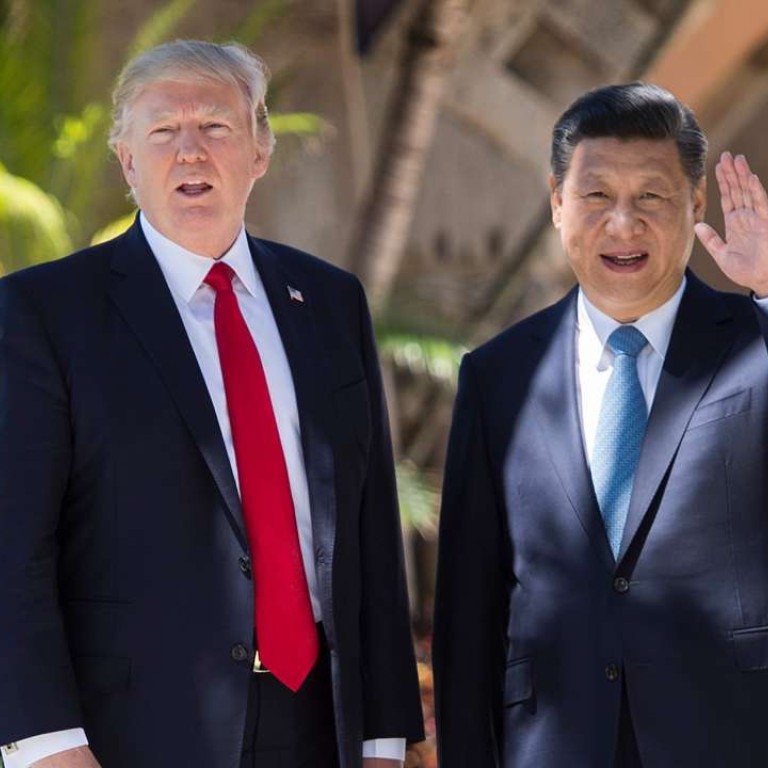
Summit with Trump sends a message home for Xi
State media are hailing the meeting as a much-needed stabilisation of Sino-US ties, but some analysts say it could also benefit China’s president in the lead-up to this year’s party congress
Mainland state media are portraying President Xi Jinping as a strong leader who managed to stabilise China-US relations during two days of meetings with his US counterpart Donald Trump in Florida.
But some analysts say the real importance of last week’s summit was in building Xi’s political portfolio ahead of this autumn’s keynote 19th Communist Party congress.
Party mouthpiece People’s Daily said in an editorial on Sunday that the Chinese president’s first meeting with Trump at the latter’s private retreat in Florida had “built friendship and trust” and set the tone for a “stronger, higher and prettier” bilateral relationship that could last for decades.
Xinhua said Xi and Trump built good working and personal relations during their seven hours of conversation in various meetings at Mar-a-Lago.
“It shows there is a stable transition of China-US relations after the inauguration of the new administration,” Xinhua reported, adding that “highly efficient, smooth and harmonious meetings between the two state leaders play an important role”.
“This meeting was basically symbolic. Xi wants to build the image that he has both domestic and foreign issues under control,” said Chen Daoyin from Shanghai University of Political Science and Law.
After months of speculation and concerns about the Trump administration’s China policies, the Chinese leadership urgently needed to stabilise this “most important bilateral relationship”, as Xi needed a stable international environment in order to focus on internal issues, Chen said.
Political commentator Zhang Lifan said Xi’s informal trip to Trump’s “winter White House” in Florida served his agenda for this year’s party congress, during which the top leadership will be reshuffled. “Xi’s target is to stabilise the Sino-US relationship at all costs, in order to eliminate any potential impact on the personnel arrangements at the party congress,” Zhang said.
A trade war with the US would affect the Chinese economy badly, and a military clash on the Korean peninsula would trigger a political crisis in China and put the leadership under challenge from inside the party, Zhang said.
Xi had been trying establish with the United States a “new type of relationship between great powers”, a concept that had been rejected by former US president Barack Obama but was subtly echoed recently by Rex Tillerson, Trump’s secretary of state.
In between the summit and the party congress, Chinese leaders would want to keep the Sino-US relationship on a positive track, for which they would be willing to make compromises, according to Pang Zhongying, a professor of international relations at Renmin University.
But whether they could make progress on the 100-day plan for trade talks to increase US exports and reduce the trade deficit with China would be crucial to keeping the positive momentum.
The deadline in the middle of July is very close to the Group of 20 summit in Germany, scheduled for July 7-8. It may be another opportunity for the two presidents to meet.
Trump tweeted on Saturday: “Goodwill and friendship was formed, but only time will tell on trade.”
“It would be quite a challenge for China to reach agreement on these tough issues by July and keep the momentum until then,” said Pang, adding that the US had also raised at the summit tough issues like intellectual property and human rights and maritime disputes involving China.
In January, the US trade deficit with China rose 12.8 per cent to US$31.3 billion. As of last year, China was the country with which the United States generated its largest trade deficit, accounting for about half the total.
At the meeting, Xi also invited Trump to visit to China this year.
The Trump visit, if it takes place, is likely to be timed to maximise its political impact, according to Zhang. “If Trump comes before the party congress, his visit would technically represent a vote for the incumbent leader of China,” he said.
Pang said one opportunity this year for Trump to take an East Asia tour would be the Asia-Pacific Economic Cooperation summit in Vietnam in November.

